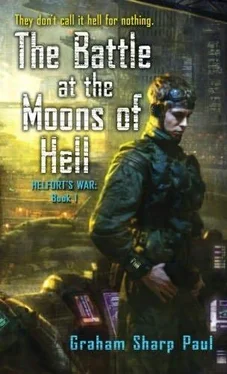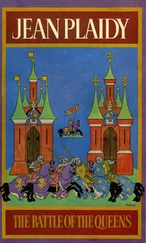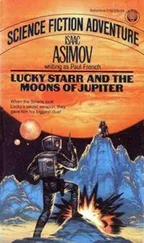Graham Paul - The battle at the Moons of Hell
Здесь есть возможность читать онлайн «Graham Paul - The battle at the Moons of Hell» весь текст электронной книги совершенно бесплатно (целиком полную версию без сокращений). В некоторых случаях можно слушать аудио, скачать через торрент в формате fb2 и присутствует краткое содержание. Жанр: Космическая фантастика, на английском языке. Описание произведения, (предисловие) а так же отзывы посетителей доступны на портале библиотеки ЛибКат.
- Название:The battle at the Moons of Hell
- Автор:
- Жанр:
- Год:неизвестен
- ISBN:нет данных
- Рейтинг книги:5 / 5. Голосов: 1
-
Избранное:Добавить в избранное
- Отзывы:
-
Ваша оценка:
- 100
- 1
- 2
- 3
- 4
- 5
The battle at the Moons of Hell: краткое содержание, описание и аннотация
Предлагаем к чтению аннотацию, описание, краткое содержание или предисловие (зависит от того, что написал сам автор книги «The battle at the Moons of Hell»). Если вы не нашли необходимую информацию о книге — напишите в комментариях, мы постараемся отыскать её.
The battle at the Moons of Hell — читать онлайн бесплатно полную книгу (весь текст) целиком
Ниже представлен текст книги, разбитый по страницам. Система сохранения места последней прочитанной страницы, позволяет с удобством читать онлайн бесплатно книгу «The battle at the Moons of Hell», без необходимости каждый раз заново искать на чём Вы остановились. Поставьте закладку, и сможете в любой момент перейти на страницу, на которой закончили чтение.
Интервал:
Закладка:
There was no real choice. The future economic and social well-being of all the Hammer Worlds depended on it.
Merrick waved Digby into a chair.
“Brigadier General Digby, welcome back. How was Hell?” Merrick asked. It was his usual little joke and about as jolly as the chief councillor ever got. Not for nothing did his enemies, and they were legion, call him the Grim Reaper.
“Hell, sir.” That was Digby’s habitual response. “By Kraa, that place is well named. A more damned collection of lost souls is hard to imagine. But Prison Governor Costigan has things as well under control as ever.”
“He wasn’t curious?”
“He was very curious but took great care not to ask any questions. I think he knows when to keep his mouth shut, and I suspect he also knows how quickly he would join his charges if he didn’t.”
Digby’s face made it clear how much he enjoyed the thought of Prison Governor Costigan, a miserable and bitter man at the best of times and a man never easy to deal with, becoming one of the tens of thousands of unfortunates condemned to labor in the mass driver plants on the moons of Revelation-II, the second planet of the Revelation system.
The planet was unofficially but widely referred to as what it was-Hell. A living Hell. Unfortunately for its inmates, Hell and its moons were an important part of Commitment’s economy in a system devoid of other sources of mass for fusion-powered mass driver engines. Without ultracheap mass for starship engines, no space economy could work and the Hammer would be doomed. And without AI-based management, geneering, self-replicating robotics, and all the other things held by the Path of Doctrine to be absolute abominations, prison labor was the only economical-if marginal-way to operate the mines spread across seventeen of Hell’s twenty-two moons. It also solved the problem of what to do with the countless unfortunates who fell afoul every year of Doctrinal Security, trapped like flies in the endless webs of half-truth, deceit, treachery, and revenge spun by DocSec’s enormous secret army of informers.
Oh, yes, it was a good place to put those Hammers who strayed too far from the Path, Merrick thought. It was also a good place to consign any out-system travelers stupid enough to wander uninvited into Hammer-controlled space without a good excuse for being there, and there was no such thing as a good excuse. If they were lucky, Hammer prisoners would eventually return to civilized Kraa society. But off-worlders would labor in the mass driver plants until old age, overwork, or a brutal beating from a bored prison supervisor finished them off.
“Digby, that was a very uncharitable thought. I’m sure Governor Costigan is-and I hope will remain-a valued member of the Faith.”
The chief councillor’s faint, almost imperceptible smile, more a sneer than a smile, betrayed him. He watched as a tremor ran barely visible through Digby’s squat frame. Just as well, Merrick thought, pleased with himself. It never hurts to remind your subordinates they should fear you, and Digby clearly had gotten the message that he was no less expendable than Prison Governor Costigan.
“It was uncharitable, sir,” Digby agreed. “But I’m sure Costigan will not let us down. He’ll treat the arrival of a shipment of off-worlders the same as any other shipment of transgressors. With ruthless efficiency, as usual and without question.”
“Good, let’s hope so. We have enough to worry about as it is.” Merrick’s words were an order, not a wish, and Digby nodded his acceptance. “So, General. Your report?”
“Well, sir, I have completed the review of the various options open to us, and I’m happy to report that it confirms Frontier as our best choice. It is a matter of public record that the Frontier Worlds Development Corporation successfully completed its planned fund-raising in August last year and placed contracts for an integrated phase one terraforming package with Planetary Dynamics Corporation two months later.”
“And the name of their new planet?”
“Ganesh, sir. The second planet of the Acadia System.”
Merrick’s face soured, his mouth a bitter line across his creased and pallid face. This problem had frustrated him longer than he could remember. The Hammer had neither the resources nor the technology to terraform planets quickly. That meant there was no chance of settling the fourth habitable planet of the Hammer Worlds, Eternity, in any useful time scale, never mind H-5, H-6, H-7, and all the rest of the unnamed candidates for terraforming over which the Hammer had planetary development rights in perpetuity. In fact, even the simple act of choosing the name Eternity summed up the inability of the Hammer to get things done.
The Supreme Council for the Preservation of Doctrine had taken months to approve the new name in the face of strenuous opposition from the Teacher of the Worlds John Calverson. An affront to doctrine, he had said over and over until Merrick had had great trouble not reaching down the council table and strangling the fucker. Calverson should spend more time caring for the souls of Kraa’s people-which was his job as the Hammer’s supreme spiritual head, after all-and less on endless nit-picking doctrinal arguments, Merrick thought sourly. And always egged on by Polk, which didn’t help.
So the Hammer would continue to be hamstrung for as long as doctrine required it. To add further pressure, the trade and technology embargo against it remained in place. Merrick snorted derisively. Why should the Hammer sign the Planetary Use of Nuclear Weapons Treaty? If Kraa’s purposes required the use of nuclear weapons against planetary targets, Kraa’s people would use them and the rest of humankind be damned.
Meanwhile, not only was Frontier developing Ganesh, the Federated Worlds were about to settle the first wave of colonists on Roper-III, the Sylvanians had started on Guardian-I, and the Earth Alliance had plans not only for 40 Eridani A, B, and C but for Pi 3 Orionis as well, not to mention a whole clutch of orbital habitats and other worlds targeted for mineral extraction, low-g manufacturing, space tourism, and so on.
Not for the first time, Merrick cursed the Hammers’ fate, a fate that condemned them to seemingly endless stagnation without the hope of growth. Kraa’s blood! It wasn’t just the major polities in humanspace-the Old Earth Alliance, the Federated Worlds, the Sylvanians, the Javitz and Delfin Federations-that were terraforming new planets as fast as capital and skill allowed. Even the smaller systems were expanding: Frontier, the Buranans-by Kraa, the list was endless. Everywhere it was expand, expand, expand. Even that rabble on Scobie’s World had plans for terraforming in an adjacent star system, and they were practically a Hammer vassal state. And the Hammer? Nothing. It couldn’t even develop a new orbital habitat.
Merrick stopped himself dead. This was getting him nowhere.
All those things might be true, but, he thought viciously, they were going to change. And the Feds were going to help them get started. After that, it would be up to the Hammer, but the time saved would be measured in decades; the extensive use of the latest geneered bacteria and organisms would see to that. That was another reason Merrick couldn’t talk to his fellow councillors about the matter, he thought. But meeting the growing demands for more living space could not be deferred in favor of long-winded sermons from narrow-minded, stiff-necked priests like John Calverson. The stresses imposed by the growing population of the Hammer Worlds, made all the worse by a seriously underperforming economy, were beginning to open up the social fault lines in a way that had the Supreme Council increasingly concerned. Not that they had any answers other than more propaganda, more repression, more violence.
Читать дальшеИнтервал:
Закладка:
Похожие книги на «The battle at the Moons of Hell»
Представляем Вашему вниманию похожие книги на «The battle at the Moons of Hell» списком для выбора. Мы отобрали схожую по названию и смыслу литературу в надежде предоставить читателям больше вариантов отыскать новые, интересные, ещё непрочитанные произведения.
Обсуждение, отзывы о книге «The battle at the Moons of Hell» и просто собственные мнения читателей. Оставьте ваши комментарии, напишите, что Вы думаете о произведении, его смысле или главных героях. Укажите что конкретно понравилось, а что нет, и почему Вы так считаете.












